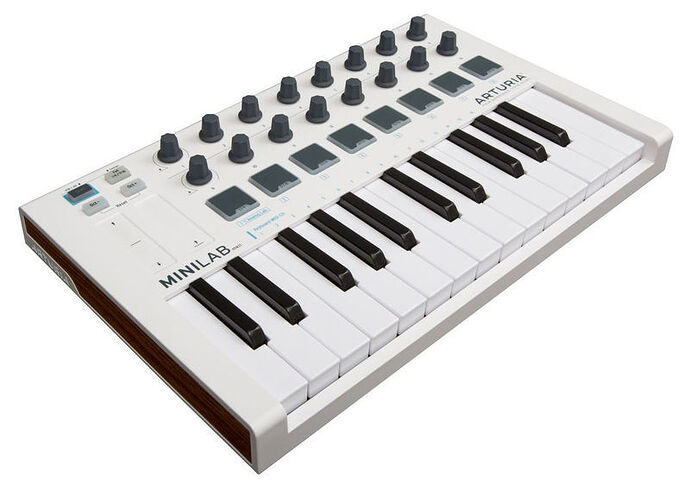Hey. An 49 key keyboard with pitch and mod to the side is about +/- 80cm wide. A 25 isn’t so wide, but clunky as well if it features controllers and such. You always need space for the stuff. On the average desk, between display and pc keyboard/mouse a midi thing of this width should always have space, or are you cramped into a grot below the kitchen table with a laptop and back pains? Have your family respect your hobby, I’d say, now a midi keyboard isn’t a horse kept and fed in the living room you wish to ride along the corridor at 4 am, damnit!
And I’d advise you to go for 49 instead of 25. I’ve tried limiting myself to 2 octaves of my 49 once, and it didn’t work. Whatever instrument, chords, or even bass, I always found I needed the extra range, and I even often octave +/- the 49, but then not having to switch back too often unlike when only having 2 octaves. Maybe very minimalistic music can be done comfortably with 25 keys. Or entering single notes one after another in non-real-time, but then the pc keyboard would just do as well with renoise.
I also only use the keyboard for jazzing around, massively while designing sounds, and entering the notes. Often trying out ideas. No live playing, no recording notes in realtime yet. I found the jazzing really automatically improves skills after a while, and with this comes much inspiration that’s only there because of the jazzing. Also entering notes first seemed awkward with the midi, but after a while the pc keyboard seemed just too flimsy for the job, midi is much better. I don’t regret having a full size keyboard, with the while using it my skill became adequate enough so a mini keybed would already limit me in trying stuff.
Maybe you’d like to visit a store and try keybeds in mini and normal format for a first glimpse. Also: keybeds vary in resistance the keys bring, half weighted is usually already very stiff to handle for non piano players, synth action is what I like best, it is very light to push keys.
I do regret though that I bought a (budget) daw controller style keyboard. If I were to buy again, I’d buy a decent keybed with mod/pitch, and then additional fader/slider devices, and some means to connect an expression pedal. You need to take into account what you want to do with it, and prepare the means to do it. Sometimes your workflow will change with time and experience. Like some people like a physical mixer, others like knobs to tweak, others like lots of pads for sequencing or live drumming, I like having a mod wheel and expression pedal at one hand and foot for 2 parameters of an instrument, and another hand to play notes or adjust more parameters via sliders to a loop pattern playing. Also I think about using mobile phones or tablets with touch interface to do sliders, bends, xy pads or so. I think they could really shine if you get used to them, and have those car mountings stiffened to your desk, or whatever.
If you wish to tweak, take care to physically try the devices. Many knob configurations are spaced very close together, and be unwieldy to handle. Also endless encoders can suck, expecially if they feature accelereation, no way to accurately tune them in action. I think those are only useful for dialing in sounds in non-live-or-recording-situations. Unless really high quality. You’d want stuff with exact position, one wrist turn for full range, good handling for the techno tweak jobs.
Don’t listen to the ffx regarding the “wooting”, it isn’t a pc keyboard with velocity, it is a gaming board that will register how deep you have each key pressed for steering in games. I don’t know of any tool or option to get velocity running on those. And I bet it just won’t work because the sensors are too slow for velocity sensing, maybe the max you could do with it would to use each key like a pressure sensing pad, kind of. Very unprecise compared to real pressure pads or even sliders/knobs. Once you have a real midi key thing you’ll never want to get back to other experiments.

